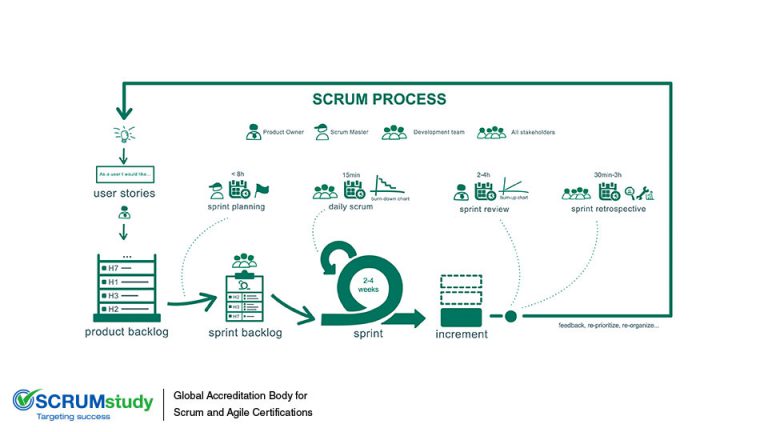Scrum training courses
Posted by SCRUMstudy® on April 03, 2024
Categories: Agile SBOK® Guide Scrum Scrum Guide Training
Scrum training courses play a pivotal role in equipping individuals and organizations with the essential knowledge and skills to embrace the Scrum framework effectively. Drawing from the Scrum Body of Knowledge (SBOK GUIDE), these courses provide a comprehensive understanding of Scrum principles, practices, and roles. Participants delve into the iterative and incremental approach to product development, learning how to maximize value through collaboration, transparency, and adaptation. From Scrum Masters facilitating seamless team processes to Product Owners steering product vision, these courses cater to diverse roles within the Scrum ecosystem. With hands-on exercises, real-world case studies, and interactive sessions, attendees not only grasp theoretical concepts but also cultivate practical expertise essential for navigating complex projects. Whether novice or seasoned professional, Scrum training courses serve as a catalyst for continuous improvement, fostering a culture of agility and innovation within organizations.
Scrum is the most widely used Agile framework for developing and managing complex software and product applications. In its simplest terms, Scrum is characterized by its core values of Plan Ahead and Inspect & Adapt. Therefore, Scrum successfully manages projects in which there is marked uncertainty and ambiguity at the early stages of the project.
With Scrum, an entire project is split into a sequence of iterations called Sprints. Each Sprint is time-boxed for not more than one month and planned well in advance. Planning is completed not according to a set of prescribed tools, but according to the requirements as decided by the Scrum team. As such, a self-organizing and a cross-functional team is the backbone of the Scrum method. In order to ensure maximum cooperation among team members, face-to-face communication is encouraged. Also, the Business stakeholders and the technical team work in close collaboration, thereby ensuring the delivery of high-quality, working software.
The two keys roles in the Scrum team are those of Scrum Master and Product Owner. The latter represents the product users and customers while the former is the chief facilitator who steers the technical team in the right direction. These two people prepare a list of priority-based features, which is called the Scrum Product Backlog. These features are developed one by one in small, repetitive development cycles consisting of the phases such as coding, testing, integrating and delivering. At the end of each Sprint, a feedback session called a Sprint Review is held during which the team delivers the developed feature to the actual production scene, and the stakeholders provide feedback based on their evaluation of the feature. The feedback obtained during the Sprint Review Meeting provides teams with input that can be used during the next Sprint.
What is the recommended number of hours for online Scrum training courses?
Posted by SCRUMstudy® on October 11, 2023
Categories: Agile Product Owner Scrum Scrum Master Scrum Principles Scrum Team
Scrum certifications are highly regarded in the realm of Agile project management, providing professionals with essential skills and knowledge to excel in their roles. Central to achieving these certifications are the Scrum certification hours, which play a crucial role in ensuring candidates meet the requirements for certification eligibility.
What Are Scrum Certification Hours?
Scrum certification hours refer to the specific hours of training or professional experience that candidates must accumulate to qualify for various Scrum certifications. These certifications, offered by organizations like SCRUMstudy, Scrum Alliance, and Scrum.org, validate an individual's understanding and application of Scrum principles and practices in real-world scenarios.
Types of Scrum Certifications
There are different levels of Scrum certifications, each requiring a varying number of Scrum certification hours:
-
Scrum Fundamentals Certified (SFC): This entry-level certification typically requires around 8 hours of training.
-
Scrum Developer Certified (SDC): Aspiring Scrum developers need to complete approximately 16 hours of training.
-
Scrum Master Certified (SMC): Scrum Masters, responsible for facilitating Agile teams, must accumulate about 16 hours of training.
-
Scrum Product Owner Certified (SPOC): Product Owners, tasked with maximizing product value, generally require 16 hours of training.
-
Scrum Agile Master Certified (SAMC): Advanced certification for Agile practitioners, necessitating approximately 16 hours of training.
Importance of Scrum Certification Hours
Accruing the required Scrum certification hours serves multiple purposes:
-
Knowledge Acquisition: The hours of training ensure candidates acquire comprehensive knowledge of Scrum principles, roles, and ceremonies.
-
Skill Development: Practical experience gained during these hours helps candidates hone their skills in Agile project management, fostering effective team collaboration and product delivery.
-
Credential Eligibility: Fulfilling the required hours is a prerequisite for sitting the certification exams, validating an individual’s proficiency in Scrum practices.
How to Accumulate Scrum Certification Hours
Professionals can accumulate Scrum certification hours through:
-
Formal Training: Attending accredited Scrum courses and workshops conducted by certified trainers.
-
Work Experience: Practicing Scrum principles in real-world projects under the guidance of a certified Scrum Master or Coach.
-
Self-Study: Participating in webinars, reading relevant literature, and engaging in online courses approved by certifying bodies.
Conclusion
In conclusion, Scrum certification hours are instrumental in preparing individuals for the challenges of Agile project management. By investing in training and practical experience, professionals not only fulfill certification requirements but also enhance their ability to lead successful Agile teams and deliver value-driven projects in dynamic business environments. For those aspiring to advance their careers in Agile and Scrum, accumulating the requisite hours is a pivotal step towards achieving certification and gaining recognition in the industry.

